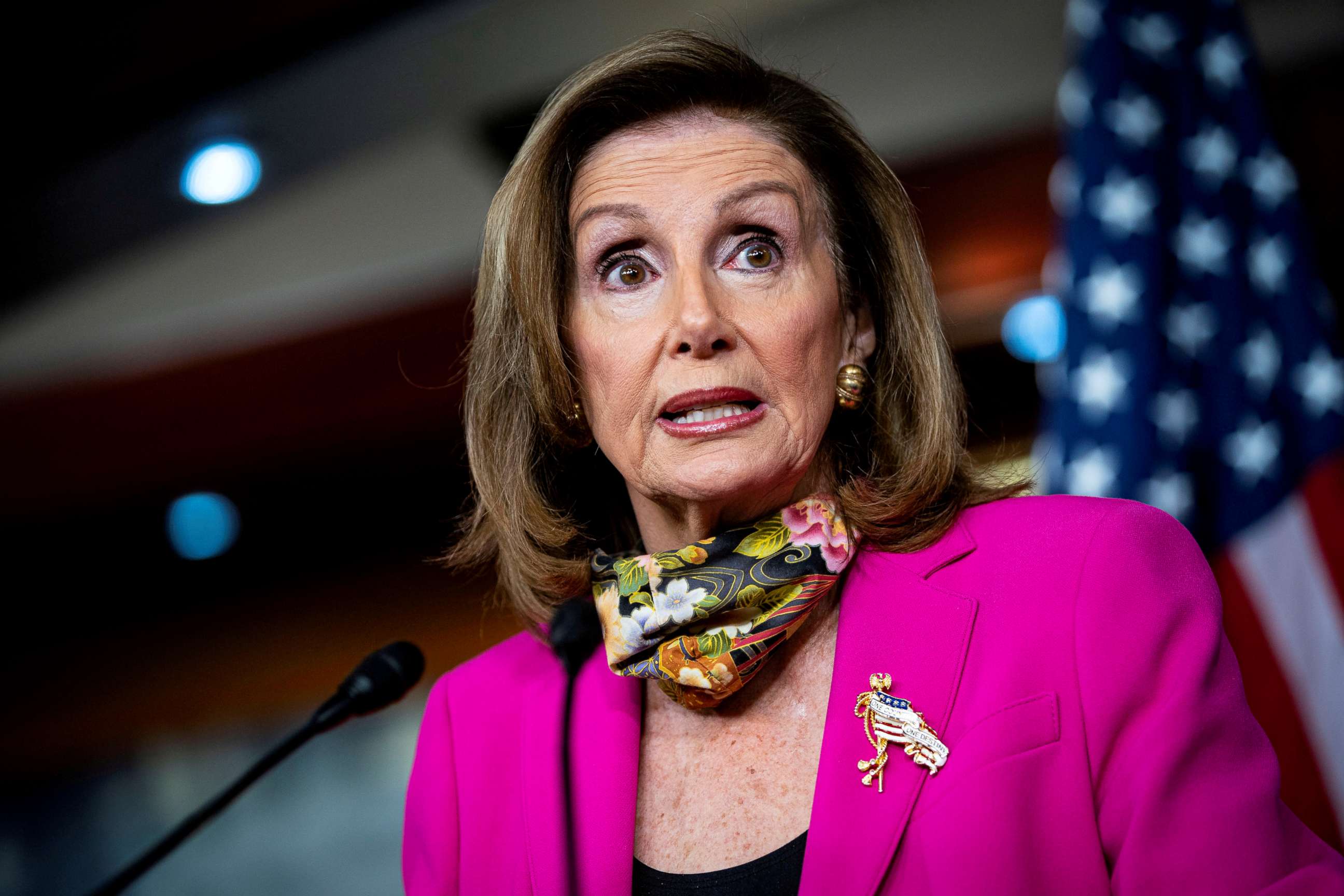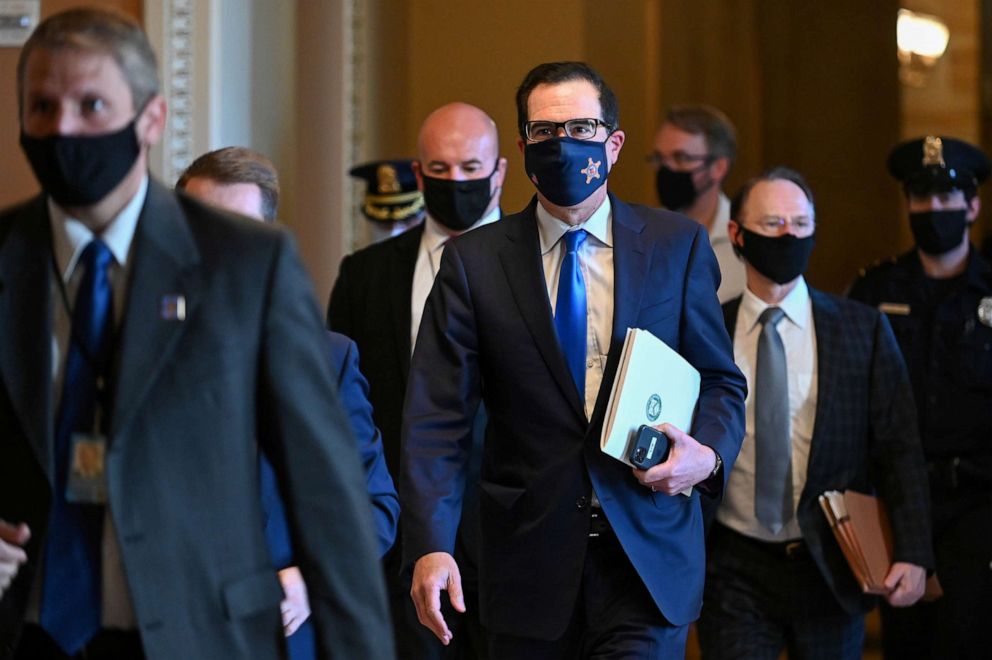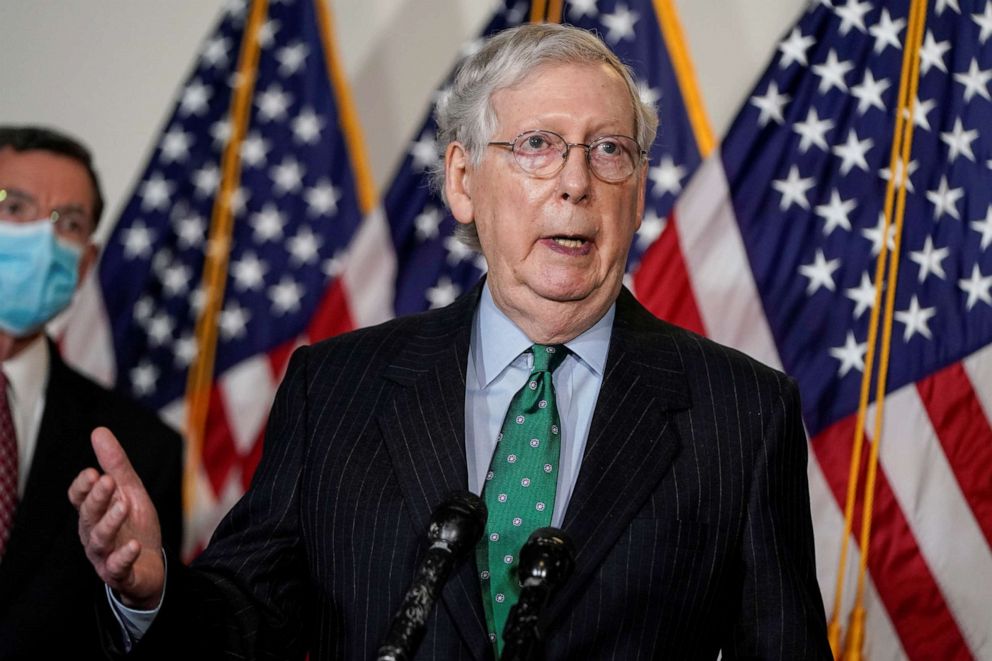A Tuesday deadline for pandemic relief deal but prospects dim
House Speaker Pelosi and Treasury Secretary Mnuchin spoke Monday.
House Speaker Nancy Pelosi and Treasury Secretary Steven Mnuchin spoke by phone Monday afternoon to try to reach a compromise on a coronavirus relief deal, after Pelosi - for the first time - set a Tuesday deadline if additional aid is to be approved before Election Day.
Pressed on ABC's "This Week" Sunday, Pelosi put the ball in the administration’s court, telling ABC News Chief Anchor George Stephanopoulos, "We don't have agreement in the language yet, but I'm hopeful,” referring to outstanding issues regarding a national virus testing plan - something on which Democrats have insisted. "I'm optimistic because, again, we’ve been back and forth on all of this," she said.
“We’re saying to them we have to freeze the design on some of these things - are we going with it or not - and what is the language,” added Pelosi who has not met with President Donald Trump for more than a year but says there’s little point to doing so.

Pelosi's deputy chief of staff, Drew Hammill, tweeted that incremental progress was made during Pelosi and Mnuchin's discussion Monday. Pelosi has tasked committee chairs to reconcile differences with their GOP counterparts, according to the tweet.
"The Speaker continues to hope that, by the end of the day Tuesday, we will have clarity on whether we will be able to pass a bill before the election," Hammill said. The two will speak again Tuesday.
In his own weekend interview with a Wisconsin television station, Trump sought to one-up Pelosi, saying he is willing to go higher than what she was proposing, despite lacking support among those in his own party.
“I'd go higher than her number, who knows what her number is, but if you said a trillion-eight, two trillion, if you said two trillion-two, so many numbers - I'm willing to go higher than that, because it wasn't the people's fault,” Trump told Charles Benson of Milwaukee station WTMJ.
Pelosi's new 48-hour deadline - just two weeks before Election Day - was met with mixed reaction by the White House. Even as White House Communications Director Alyssa Farah - in a Fox News interview - called Pelosi’s timeline “artificial,” White House chief of staff Mark Meadows welcomed it.
“The 48-hour deadline is certainly welcomed by us,” Meadows told reporters Monday morning, though the former conservative congressman, whose prior role in COVID-19 talks Pelosi has dismissed out of hand, said the speaker “continues to be very rigid in her negotiation. You know, it's her way or the highway; it's all or nothing.”

Meadows said he and Mnuchin “had a number of very fruitful discussions over the last several days that give us a hope that we may be able to reach some kind of an agreement in the next 48 hours.”
"I can tell you the president has asked us to engage, if she's willing to work in terms of some of the extreme policy initiatives that she's put forth and work on those issues,” Meadows said.
Republicans and the White House have rejected hundreds of billions in aid to states that have poorly managed state pension funds, and many - if they support any further stimulus at all - have dismissed any package with a price tag in excess of $1 trillion, putting them distinctly at odds with the president.
Pelosi and Mnuchin have been negotiating for months to reach a deal on another coronavirus relief package. The Democratic-led House passed a $3 trillion measure in May that Republicans refused to consider in the Senate, and recently the White House offered a $1.8 trillion compromise at which Senate Majority Leader Mitch McConnell scoffed.
And though McConnell said on Sunday that the Senate would “consider” any Pelosi-Mnuchin negotiated compromise, the GOP leader just days earlier rejected that effort out of hand and noted that most of his GOP conference would take that position, too.

Asked if a compromise was to be had around the $2 trillion price range, McConnell said, “I don’t think so, because my members - that’s where the administration is willing to go - my members think what we laid out a half trillion dollars, highly targeted is the best way to go. And so that’s what I’m gonna put on the floor. It’s what Senate Republicans ... feel like is an appropriate response,” adding, “There are discussions going on between the secretary of the Treasury and the speaker about a higher amount. Uh -- that’s not what I’m gonna put on the floor.”
The second-ranking Senate Republican, Sen. John Thune of South Dakota, said an agreement between Pelosi and Mnuchin would need to pass the House with enough Republican support for GOP senators to get behind it.
"If they agree to something they have to pass in the House with all Democratic votes my guess is the Leader is going to want to see some evidence that whatever is agreed upon has Republican support to try to convince Republicans over here to be for it," Thune said. "When their natural instinct depending on how big it is and what's in it is probably going to be to be against it."
In a rare instance of McConnell defying Trump, he said he would, instead, call up the same $500 billion slimmed-down GOP coronavirus relief bill that Democrats rejected last month, setting up a vote for Wednesday.
The GOP bill contains more than $100 billion for education needs, billions for a coronavirus vaccine, virus testing and tracing, a replenishment of the popular small business loan program, unemployment assistance, and a litigation shield.
On Tuesday, the Senate will also vote on a standalone relief bill aimed at replenishing the Paycheck Protection Program created in the first round of pandemic relief.
The votes will be, McConnell said, an opportunity to put Democrats on the record.
"This has been the position for months. All or nothing obstruction. It's got to stop," McConnell, R-Ky., said Monday. "The Speaker's Marie Antionette act needs to end. Zero dollars for working families but a whole lot of television time for the speaker of the house is not a good trade for the American people.
Minority Leader Chuck Schumer has already signaled that these two efforts will not pass, arguing Monday that it is "obvious" that McConnell "designed it to fail".
"This is not a serious attempt at pandemic relief it seems to be another attempt at giving Republicans political cover before the election," Schumer said.
Democrats are calling for a far more sweeping package in line with what has passed the House to include aid for hard-hit state and local governments, another round of $1200 stimulus checks fo individual Americans, and greater amounts for jobless Americans, food security, child care, and health care.
The clash between House and Senate lawmakers - not to mention between Pelosi and the Trump administration - meant that no deal was likely ahead of Election Day, something that has been apparent for weeks but few have been willing to say out loud ahead of an election that could flip the White House and possibly even the Senate.
--ABC News' Allison Pecorin, Jordyn Phelps and Ben Gittleson contributed to this report.




